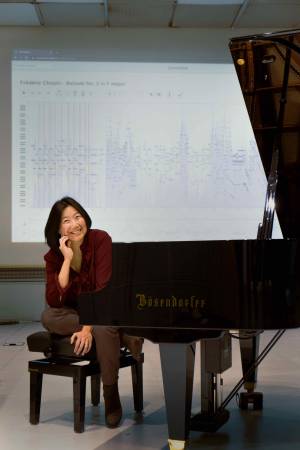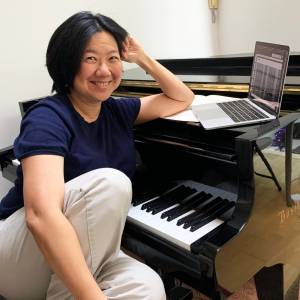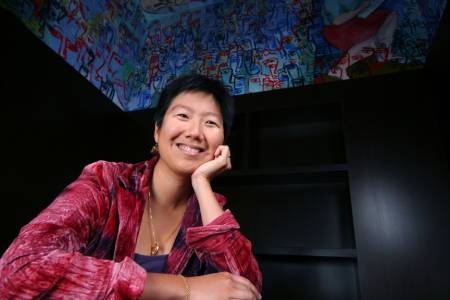Elaine Chew | COSMOS | Research Blog | Research Bio | Music Blog| Music Bio | Soundcloud | Youtube | CV
Elaine Chew: Research Bio
Elaine Chew is a senior CNRS researcher at the Science et Technologies de la Musique et du Son (STMS) Laboratory, a joint research unit (UMR9912) of the Centre National de la Recherche Scientifique (CNRS), Institut de Recherche et Coordination Acoustique / Musique (IRCAM), Sorbonne University, and French Ministry of Culture. She is a Visiting Professorship of Engineering in the Faculty of Natural, Mathematical & Engineering Sciences at King's College London. Her scientific research centers on the design of mathematical and computational tools to model, analyze, visualize, and manipulate structures in music and arrhythmia sequences.
She is recipient of a European Research Council Advanced Grant (ERC ADG) in 2018 for the project COSMOS: Computational Shaping and Modeling of Musical Structures, which aims to study musical structures as they are created in performance and in electrocardiographic recordings of arrhythmia. She is also investigating the interactions between music and cardiac response. She is past recipient of the Presidential Early Career Award for Scientists and Engineers given by the White House in 2005, the highest honor accorded young scientists and engineers in the United States. She was also awarded a Faculty Early Career Development grant by the National Science Foundation in 2005 for CAREER: Performer-centered Approaches to Computer-assisted Music Making. She was the 2007-2008 Edward, Frances, and Shirley B. Daniels Fellow and led a research cluster on Analytical Listening through Interactive Visualization at Harvard's Radcliffe Institute for Advanced Study and returned for a summer fellowship in 2017.
She is an alum (Fellow) of the (US) National Academy of Science's Kavli Frontiers of Science Symposia (German-American) and of the (US) National Academy of Engineering's Frontiers of Engineering Symposia (Japan-American, US). She received PhD and SM degrees in Operations Research at MIT (in 2000 and 1998, respectively), a BAS in Mathematical and Computational Sciences (honors) and in Music (distinction) at Stanford (1992), and FTCL and LTCL diplomas in Piano Performance from Trinity College, London (in 1987 and 1985, respectively).
She was Professor of Digital Media in the School of Electronic Engineering and Computer Science at Queen Mary University of London (2011-2019), where she founded and led research at the Music, Performance, and Expressivity (MuPaE) Laboratory at the Centre for Digital Music (C4DM). Prior to that, she was first Assistant Professor then tenured Associate Professor at the Viterbi School of Engineering joint appointment in the Thornton School of Music at the University of Southern California (2001-2011), where she was the inaugural honoree of the Viterbi Early Career Chair and founded/directed research at the Music Computation and Cognition (MuCoaCo) Laboratory. She has also held visiting appointments at Harvard's School of Engineering and Applied Sciences and Music Department (2008-2009) and at Lehigh University (2000-2001), and was Affiliated Artist of Music and Theater Arts at MIT (1998-2000). She is currently Visiting Professor at Kings College London.
She has published numerous articles in music and mathematics, music computing, and music perception journals and refereed conference proceedings, and has authored a monograph, Mathematical and Computational Modeling of Tonality: Theory and Practice (Springer 2014). She is a member of the distinguished Editorial Advisory Board of the Computer Music Journal, Editorial Board of Music Theory Spectrum, Editors' Panel of Computing in Musicology, founding member of the Editorial Board of the Journal of Mathematics and Music, founding Associate Editor of the Journal of Music and Meaning and ACM Computers in Entertainment. She has served on the visiting committee of MIT's Music and Theatre Arts Section (2004-2012) and the external review committee of Georgia Tech's School of Music (2017); and, she is adjudicator for the 2017 Guthman Musical Instrument Competition and the Falling Walls Lab Finale in Berlin.
She is a frequent invited keynote and plenary speaker on music and technology at international conferences. Her work has been featured in Der Spiegel, Los Angeles Philharmonic's Inside the Music, BBC Radio 3 and BBC World Service, podcasts of Ada Lovelace Day and the Barbican, as well as an exhibition on Beautiful Science: Ideas that Changed the World at the Huntington Library in California. She has also been interviewed and her work featured in documentaries on the lives of geometer Donald Coxeter (The Man Who Saved Geometry) and master bridge designer Ralph Modjeski (Bridging Urban America). As a pianist, she has performed as chamber musician and soloist at numerous venues worldwide and frequently collaborates with composers to commission, create, present, and record on Albany (Doubles) and Neuma (Child's Play) Records eclectic post-tonal music. For further details, see her music bio.




